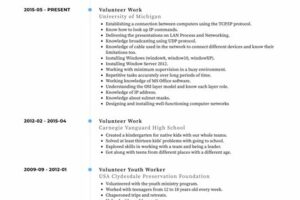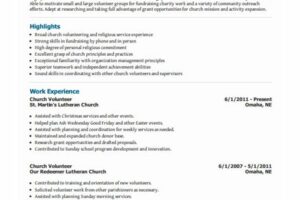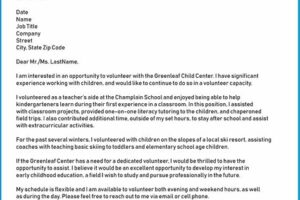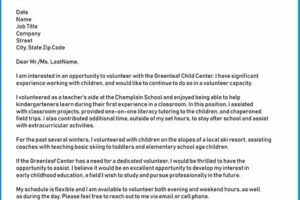Table of Contents
Can volunteer experience count as work experience? Many employers value volunteer work and consider it as valuable as paid work experience. Volunteering can showcase your skills, dedication, and commitment, making it a valuable addition to your resume. However, it is important to present your volunteer experience in a professional manner and highlight relevant skills to make it count effectively.
Volunteer experience can be a valuable asset when it comes to building a strong resume and gaining relevant work experience. While some may question whether unpaid work can truly count as professional experience, it is important to recognize the numerous skills and qualities that volunteering can cultivate. Transitioning seamlessly into the workforce, volunteer experience allows individuals to develop transferable skills, gain real-world exposure, and demonstrate their commitment to making a positive impact. This makes it an excellent addition to any resume, showcasing a well-rounded individual with a passion for personal growth and community development.
Introduction
In today’s competitive job market, having relevant work experience is essential for securing employment. However, many individuals may find it challenging to gain formal work experience, especially if they are just starting their careers or transitioning to a new field. In such cases, volunteer experience can be a valuable asset that can count as work experience. This article explores the benefits of volunteer experience and how it can contribute to one’s professional growth.
The Value of Volunteer Experience
Volunteering offers individuals the opportunity to contribute to their communities while gaining valuable skills and experiences. Whether it’s working at a local charity, assisting in community development projects, or participating in environmental initiatives, volunteer work allows individuals to develop transferable skills that are highly sought after by employers.
Transferable Skills
One of the significant benefits of volunteer experience is the acquisition of transferable skills. These skills are applicable across various industries and can be leveraged in different work settings. Examples of transferable skills gained through volunteering include communication, teamwork, problem-solving, leadership, and adaptability. These skills are highly valuable to employers and can make volunteer experience count as work experience.
Showcasing Relevant Experience
When applying for a job, it is crucial to highlight relevant experience that aligns with the position’s requirements. Volunteer experience can often be tailored to demonstrate skills and abilities that are directly applicable to the desired job. By showcasing volunteer experience effectively on a resume or in an interview, individuals can present themselves as qualified candidates, even if they have limited formal work experience.
Resume Enhancement
Volunteer experience can significantly enhance a resume, especially for entry-level job seekers or those changing careers. When including volunteer work on a resume, individuals should focus on highlighting the skills and accomplishments achieved during their volunteer activities. By emphasizing relevant tasks, projects, and outcomes, volunteer experience can effectively demonstrate practical skills and make a strong impression on potential employers.
Networking Opportunities
Volunteer work often provides excellent networking opportunities that can lead to future employment prospects. Building relationships with professionals in the field can open doors to job opportunities, mentorship, and valuable connections. By actively engaging with fellow volunteers, coordinators, and community members, individuals can expand their professional network and increase their chances of finding relevant work.
References and Recommendations
Volunteering can also provide individuals with credible references and recommendations. Supervisors and coordinators who oversee volunteer programs can serve as references for future job applications. Their recommendation letters can vouch for an individual’s work ethic, dedication, and skills developed through volunteer experience. These references can help validate one’s professional capabilities and make volunteer experience count as work experience.
Professional Development
Engaging in volunteer work offers individuals numerous opportunities for professional development. Many organizations provide training programs, workshops, and certifications for their volunteers. By participating in these initiatives, individuals can acquire specialized knowledge and skills that are directly applicable to their desired field. This continuous learning and professional growth contribute to the overall value of volunteer experience as work experience.
Industry Exposure
Volunteering also provides individuals with exposure to various industries and sectors. This exposure can be particularly beneficial for those looking to explore different career paths or gain insight into specific fields. By volunteering in areas related to their professional interests, individuals can demonstrate their passion and commitment to potential employers. Moreover, this exposure allows individuals to make informed decisions about their career goals and aspirations.
The Importance of Personal Growth
Besides the professional benefits, volunteer experience also contributes to personal growth. Engaging in meaningful volunteer work can boost self-confidence, develop empathy and compassion, and enhance interpersonal skills. These personal qualities can positively impact one’s professional life, making volunteer experience a valuable component of an individual’s overall work experience.
Leadership Opportunities
Volunteer roles often provide individuals with opportunities to take on leadership positions. Whether it’s leading a team of volunteers, coordinating events, or managing projects, these experiences help individuals develop leadership skills and qualities. Demonstrating leadership abilities through volunteer work can be highly advantageous when seeking employment, as employers value individuals who can effectively lead and motivate teams.
Conclusion
Volunteer experience can undoubtedly count as work experience, especially when it aligns with the desired job or demonstrates transferable skills. By effectively showcasing volunteer experience on resumes, leveraging networking opportunities, and highlighting professional and personal growth, individuals can demonstrate their qualifications and stand out to potential employers. Ultimately, volunteer experience offers a valuable pathway to gain relevant experience, develop skills, and contribute to one’s professional journey.
The Value of Volunteer Experience
Volunteer experience is certainly valuable and can be considered as work experience in many situations. While it may not involve monetary compensation, the skills, knowledge, and dedication gained through volunteering can be just as applicable in a professional setting. Employers often appreciate candidates who show a commitment to helping others and a willingness to contribute to their community.
Transferring Skills and Responsibilities
Volunteer work often involves similar tasks and responsibilities to paid employment, making it an excellent opportunity to develop and transfer skills. Whether it’s managing a team, organizing events, or working in customer service, these experiences can be showcased on a resume to demonstrate relevant abilities. Highlighting the specific tasks and accomplishments achieved during volunteer work can make a compelling argument for its inclusion as work experience.
Demonstrating Dependability and Initiative
Volunteering requires dedication, reliability, and a proactive approach, which are valued attributes in the workplace. Employers are often interested in candidates who have demonstrated initiative outside of their paid roles, showing their commitment to personal growth and taking on responsibilities voluntarily. By highlighting these qualities gained through volunteer experience, individuals can enhance their marketability to potential employers.
Building a Strong Professional Network
Volunteering often provides opportunities to connect and collaborate with professionals from diverse fields. These relationships can lead to valuable professional network connections and potential job referrals. By leveraging these connections and mentioning them in a resume or job application, volunteer experience can be used to enhance one’s work experience and expand opportunities.
Overcoming Limited Work Experience
For individuals who may have limited paid work experience, volunteering can be a great way to bridge the gap. It allows candidates to highlight their dedication, skills, and passion for a particular field, even if they haven’t had the opportunity to gain direct professional experience. Including volunteer work in a resume can demonstrate a proactive approach towards personal and professional development.
Tailoring Volunteer Experience to Match Job Requirements
When applying for a specific job, candidates can strategically choose relevant volunteer experiences to showcase. By aligning the skills and responsibilities gained through volunteering with the job requirements, individuals can emphasize their suitability and unique value proposition. This targeted approach helps demonstrate the transferable skills and industry knowledge gained through volunteer work.
Providing Evidence of Well-Roundedness
Volunteer experience adds another dimension to a candidate’s overall profile, showing that they are not solely focused on paid work but are also committed to making a difference in their community. This evidence of being well-rounded can make individuals stand out in competitive job markets and demonstrate their ability to balance different responsibilities effectively.
Enhancing Personal Growth and Development
Engaging in volunteer work often leads to personal growth, increased self-confidence, and the development of new skills. These intangible qualities can be highly appealing to employers. By recognizing and highlighting the personal development achieved through volunteer experience, individuals can present themselves as dynamic and adaptable candidates in the professional world.
Volunteer experience can indeed count as work experience, as it provides individuals with valuable skills and knowledge that can be transferable to the professional world. While some may question the validity of volunteer work in comparison to paid employment, it is crucial to recognize the numerous benefits that volunteering offers and how it can enhance one’s professional growth.
Here are several reasons why volunteer experience should be considered as work experience:
- Development of transferable skills: Volunteering allows individuals to develop a wide range of transferable skills such as communication, teamwork, leadership, problem-solving, and time management. These skills are highly sought after by employers across various industries and can easily be applied to a professional setting.
- Exposure to real-world challenges: Volunteers often encounter real-world challenges similar to those faced in paid employment. They learn to adapt, think critically, and find innovative solutions to overcome obstacles. These experiences demonstrate an individual’s ability to handle workplace challenges effectively.
- Evidence of commitment and dedication: Volunteering requires individuals to devote their time, energy, and resources to a cause without monetary compensation. This demonstrates a strong sense of commitment and dedication towards making a positive impact in the community. Employers value these qualities as they indicate an individual’s work ethic and passion.
- Networking opportunities: Volunteer work often involves collaborating with diverse groups of people, including professionals from various fields. These connections can lead to valuable networking opportunities, which can open doors to future employment prospects. Additionally, volunteers may also receive recommendations or references from supervisors or colleagues, further validating their experience.
- Enhanced understanding of social issues: Through volunteering, individuals gain a deeper understanding of social issues and develop empathy and compassion. This heightened awareness can be beneficial in many professional settings, especially those that involve working with diverse populations or advocating for social change.
- Personal growth and self-improvement: Volunteering often involves personal growth and self-improvement, as individuals are exposed to new experiences and perspectives. This growth can positively impact an individual’s professional development, as they become more adaptable, open-minded, and culturally aware.
In conclusion, volunteer experience should not be underestimated or undervalued when considering its relevance as work experience. The skills, dedication, and personal growth gained through volunteering can greatly enhance an individual’s professional profile and make them a valuable asset to any organization. It is essential for employers to recognize the value of volunteer experience and consider it alongside paid work experience when evaluating candidates for employment opportunities.
Thank you for taking the time to visit our blog and read our article on whether volunteer experience can count as work experience. We hope that you found the information provided helpful and insightful. In this closing message, we would like to summarize the key points discussed and leave you with some final thoughts to consider.
Throughout the article, we have examined the question of whether volunteer experience can be considered as valuable as traditional work experience. While there may be differing opinions on this matter, it is clear that volunteer experience can indeed hold significant weight and be seen as a valuable asset when seeking employment opportunities.
Firstly, we discussed how volunteer experience can demonstrate important skills and qualities that employers often seek in candidates. Whether it is leadership, teamwork, problem-solving, or adaptability, engaging in volunteer work allows individuals to develop and showcase these skills in a real-world setting. By highlighting your volunteer experience on your resume or during an interview, you can effectively demonstrate your ability to contribute to a team and make a positive impact.
Secondly, we explored how volunteer experience can provide individuals with industry-specific knowledge and expertise. Many volunteers have the opportunity to work in roles that align with their career interests, giving them hands-on experience in their chosen field. This practical experience can be just as relevant and valuable as formal work experience, especially for those who are looking to transition into a new industry or gain exposure to a particular sector.
In conclusion, while volunteer experience may not always carry the same weight as traditional work experience, it can undoubtedly count as valuable experience. The skills, qualities, and industry-specific knowledge gained through volunteer work can be highly transferable and attractive to potential employers. So, if you are considering volunteering or have already engaged in volunteer work, we encourage you to embrace and highlight this experience as part of your professional journey.
Once again, thank you for visiting our blog. We hope that you found this article informative and that it has provided you with a fresh perspective on the value of volunteer experience. Remember, every experience counts, and by recognizing the importance of volunteer work, you can enhance your chances of securing your dream job. Good luck!
Video Can Volunteer Experience Count As Work Experience
People also ask about whether volunteer experience can count as work experience. Here are the answers:
Can volunteer experience be considered work experience?
Yes, volunteer experience can be considered work experience. Although it may not involve compensation in the form of monetary payment, it still provides valuable skills, knowledge, and practical experience that can be relevant to certain job roles.
Do employers value volunteer experience?
Yes, many employers value volunteer experience as it demonstrates an individual’s commitment, dedication, and willingness to contribute to their community or causes they believe in. It can highlight important qualities such as teamwork, leadership, and a strong work ethic.
How can I include volunteer experience on my resume?
You can include volunteer experience on your resume by creating a separate section dedicated to it. Provide details about the organization you volunteered for, your role or responsibilities, and any achievements or outcomes resulting from your volunteer work. Emphasize the skills and experiences gained through volunteering that are relevant to the job you are applying for.
Should I prioritize volunteer experience over paid work experience?
The prioritization of volunteer experience over paid work experience depends on the specific job you are applying for. If the volunteer experience directly relates to the skills and requirements of the position, it may be beneficial to prioritize it. However, in general, paid work experience tends to hold higher importance to employers as it demonstrates a proven ability to perform in a professional setting.
Can I use volunteer experience to fill gaps in my work history?
Absolutely! Volunteer experience can be an excellent way to fill gaps in your work history. It shows that you have actively engaged in productive activities during periods of unemployment or career transitions, which can help demonstrate your dedication and willingness to continually learn and contribute.
Remember, while volunteer experience can be valuable, it’s also important to highlight any relevant paid work experience and tailor your application materials to the specific job requirements.






